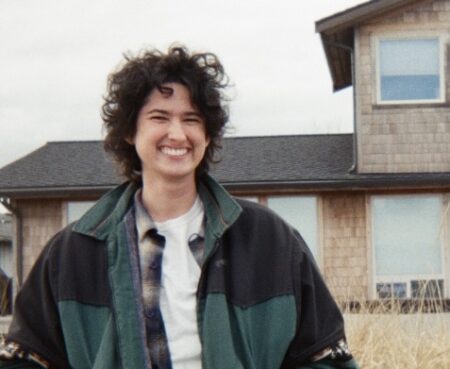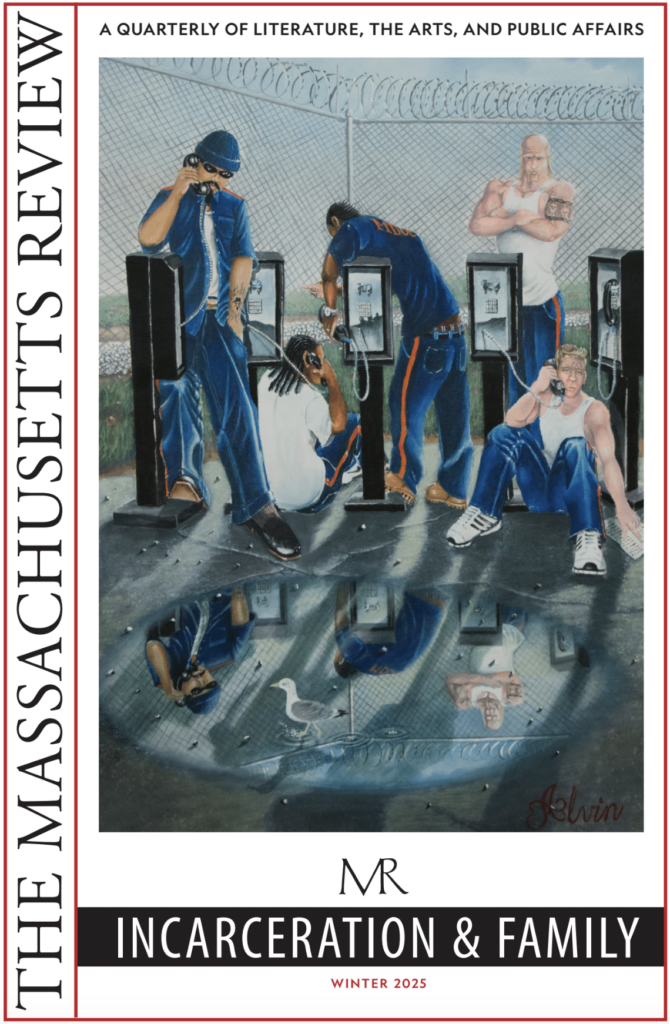10 Questions for Arro Mandell

The yellow seagrass was taller then. The dried stalks brushed my shoulders as I journeyed from the house to the beach. The journey was long, required wile. My mother twenty years younger watched me from the porch. She didn’t yet know what her life would be.
—from Arro Mandell’s “Dream A Highway Back,” Volume 66, Issue 2 (Spring 2025)
Tell us about one of the first pieces you wrote.
I’m not sure. I wrote poetry all time as a kid. I found one of my notebooks from second grade and I had this whole poem about being up past midnight and feeling like everything was far away and close at the same time. Still a feeling that gets me writing! And there were lots of poems in that notebook about feeling magic through looking at what was around me. I feel like I was writing about the same things (very differently of course). It really surprised me. I feel like I’m always coming back to the same place and thinking it’s totally new. Maybe it still is.
What writer(s) or works have influenced the way you write now?
Oh that’s hard. So many— so this will just be a few.
The first poem I ever fell in love with was in high school— it was “In a Dark Time” by Theodore Roethke. Something about the combination of sound, imagery, and sustained thought in Wallace Stevens was very influential to me very early on. The chatty and expansive voices in AR Ammons’ long poem, Garbage, and in Ross Gay’s Unabashed Gratitude are a huge inspiration to me. All that mixing of joy and grief and listening in Ross Gay too. I love Kaveh Akbar’s poems and Adalia Prado’s collection Ex Voto. They both blend the mundane and spiritual in this way that makes everything feel so large. I’m chasing that too. My first teacher, Marie Howe, influenced my writing tremendously. Her work too. She taught me to pay attention.
What did you want to be when you were young?
I really wanted to be a singer when I was a kid. When I was in elementary school, I wrote a song for the school talent show. I remember writing it by singing in the bathtub staring at these glass sliding panels on the tub with mermaids etched on them. To practice for the show, the school assigned each student to a teacher to help us prepare. My teacher, the drama teacher, kept suggesting that because I didn’t have any instrumentals recorded, I should just read it as a poem. On the day of the talent show, my mom’s friend came through with a CD of himself playing a piano back track for the song. My mom suggested that if I didn’t speak it, the drama teacher might see me as hard to work with and not want to cast me in the 5th grade musical so I decided to sing every other line. It was ridiculous. The next year, during a rainy recess, they played the recording of the talent show. When I heard myself, I finally understood why she suggested I didn’t sing…
What inspired you to write this piece?
I was visiting Seattle for “AWP” (though I don’t think I ever went into AWP) with my partner. My dad is from the area and his whole side of the family is out there so we used to go every year until my grandmother died when I was 12 or 13. After that, we abruptly stopped going to Washington and seeing that part of my family. When we were visiting, my partner and I stayed with a relative I hadn’t seen for years in Seattle and then we rented a car and drove up towards the Olympic National Rainforest. We stopped in Sequim where my grandmother’s beach house is. I hadn’t been there since her funeral. It got sold right away. Seeing it again was this very odd experience of re-seeing this place that was so huge to me as a kid. Growing up in New York City, it was this sort of wild place of nature— a totally different world. My time there was so encapsulated and distinct, cut off kind of abruptly from my the rest of my life. Being there again made me feel simultaneously in touch with my younger self and so far away from that little me. It was especially odd showing this very old place to, at the time, my very new partner. Half of what I thought I had to show them wasn’t there— had it been there before? I didn’t know.
At the same time, one of my teachers had been pushing me to include work in my manuscript that showed some of the difficulty of starting T— not just the joy of it. I initially felt resistant to this because trans experience is so often reduced to suffering— but at the same time part of what felt so powerful about starting testosterone was the relationship it put me in with loss. I was afraid taking T was going to affect my relationships with important people in my life— it would mean that I couldn’t pick and choose who to be open with about my transness. I was afraid it would make me undesirable. I was afraid I would regret it— that I would lose something unmarked about my life, that my body was ‘natural’ the way it was and that I might be ruining it (of course this feeling had to do with state/capital’s investment in reproducing a cis-hetero population). Taking T made me realize that my body would be marked (and had been marked) by world/time no matter what I did, and that my desire could be and should be another force shaping my body/self. It meant accepting my own agency. So ultimately, I felt like it was important to write about some of these kinds of losses. I’ve been lovingly accused of avoiding my own negative emotions so I’m glad for the push to go there.
So wanting to write about this was kind of in the background of the trip. When I got on the plane to leave, all these questions about self and memory mixed and I wrote this essay as we took off.
Is there any specific music that aids you through the writing or editing process?
It really depends! Sometimes I like it to be completely silent when I write. If I’m listening to music, it’s usually the same song over and over the whole time I’m working on that piece. With this piece, I was listening to “I Dream a Highway” by Gillian Welch as the plane was taking off. I would write down a lyric that stood out to me and then write what became the essay and then write another lyric— back and forth. It kept the piece moving, enabling it to jump from moment to moment and inflecting it with the nostalgia and yearning in the song. Ultimately, I cut the lyrics from the piece, but I couldn’t have written it without the song.
Do you have any rituals or traditions that you do in order to write?
This also depends. My writing practices change all the time. When I was younger, I was really trying to be a sit-down-at-the-same-time-at-the-same-place-everyday writer, but that really didn’t work for me. It was always fraught and full of failure. When I let go of the idea of writing all together, I started writing only when it felt pleasurable or exciting to me. I wrote more than ever, because it turned out I liked writing. That summer, when I was working on the farm in Montana, I started writing a poem to God every night right before bed. I did it because I wanted to experience the physical sensation of God and it felt like some way to get towards that. I don’t know if that’s a ritual, but it felt like one. Every new writing era comes with new rituals.
Who typically gets the first read of your work?
If I feel like something actually happened while writing, which means I felt some urgency around expressing something, I usually share things with one of my friends pretty quickly. Lately, though, I’ve been keeping my work private, which has this wonderfully different energy. I’ve been writing a long poem over the course of months and every time I open my notebook, it feels like I’m returning to this very secret and private world. I really feel like I can write whatever I want. It’s not that I think secret or share-y is better. They just bring different tones to the work.
If you could work in another art form what would it be?
Dance! Dancers are so cool. In my romanticized version of dancing, they get to be totally inside their bodies, totally expressive, and completely in a state of listening all the time. I’m sure that’s not how it actually feels, but watching dance, it seems completely unlimited. I mean dancers basically fly. I would love to fly.
What are you working on currently?
I’m kind of constantly tweaking this manuscript I have. I like to just come to it every now and then and see what revisions feel available that day. It feels like checking to see if a vegetable is ready to harvest. More regularly, I’m working on my secret project! I’ve been working on it since last year. I think it’s about refusal, collectively and individually. Also about love, collectively and individually. That’s all I’ll say for now.
What are you reading right now?
I’m having the time of my life reading novels! I’m reading Zami now. I just finished Desertion. Before that was the Neapolitan Quartet. I stopped reading novels regularly when I grew up for some reason and it’s amazing coming back to it. I love being in a story. In terms of poetry, I’m mostly reading it in groups. I’m taking a class called Muddled Ground: Poetry and Revolution with Ivanna Baranova through the poetry society and it’s been completely amazing to read with everyone. I’m learning so much. I feel like poetry means so much more when you read it with other people. That’s what’s amazing about it to me, though sometimes it frustrates me.
ARRO MANDELL (they/he) is originally from Brooklyn. Their work can be found in the Southeast Review and the Georgia Review. He’s currently working on a farm in the Hudson Valley.



